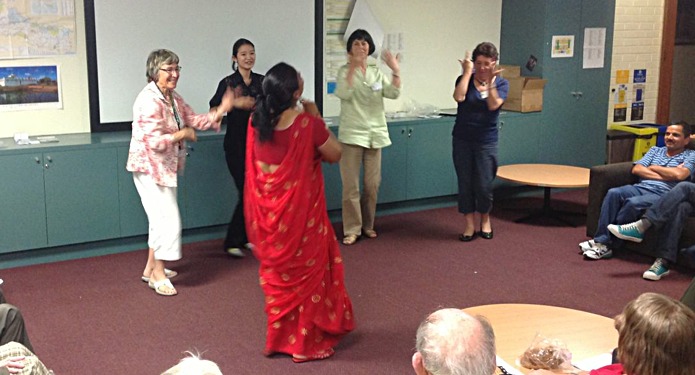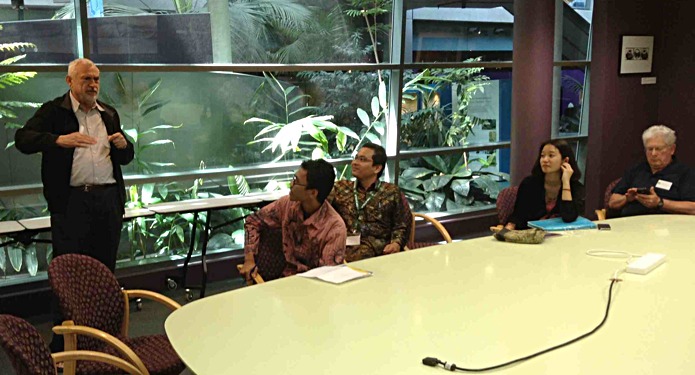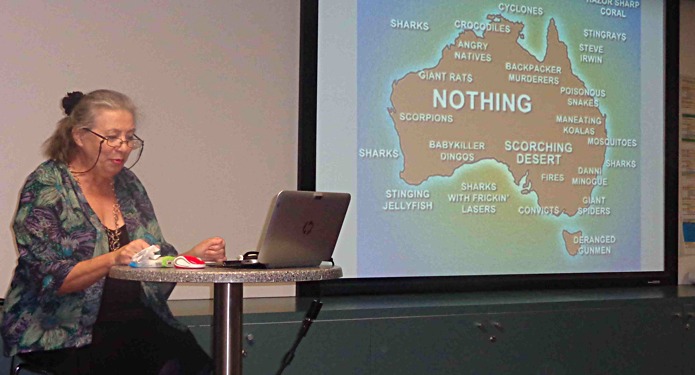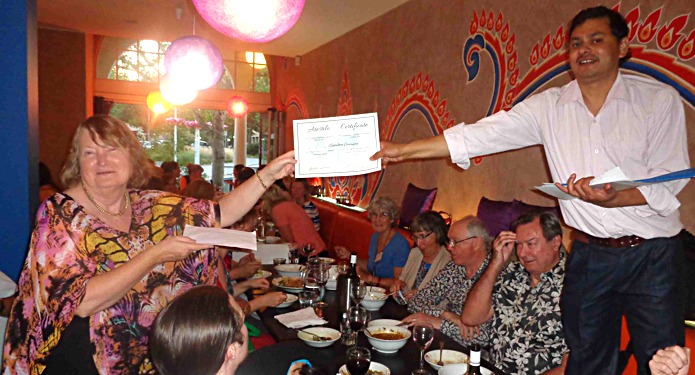Canberra, 3–12 January 2014
In the Australian National University in Canberra, one of countless buildings is called Ursula Hall. This is where the Board of AEA organised the Australian Esperanto Association 2014 Congress and Summer School.
About 52 eager people took part, from Korea, Nepal, Indonesia, Germany, New Zealand, Vietnam, New Caledonia, Hungary, and even more from Australia.
We met in a very clean, beautiful and large room. On the second evening (Saturday) Trevor Steele led a quiz, which amused us all, despite the fact that he prize was to be only the winner’s pride.
On Sunday morning there was an ecumenical church service. This was very interesting. We heard about many different religions and learned much. There was also some excursions to interesting places in the Australian Capital Territory.
The food and drink in the congress were many and varied. Perhaps many of us ate far more than was good for our health, but they were delicious.
There was a few performances of various kinds, for example the Nepalese Evening, presented by Indu Thapalia and Bharat Ghimire. We heard everything worth knowing about Nepal. Afterwards, Indu presented some Nepalese dance. Little by little, many beautiful fellow Esperantists joined in.

Indu Thapalia leads fellow Esperantists in a modern Nepalese dance
Jonathan Cooper spoke brilliantly about art. Lumera Nohill also spoke, about the Korean Esperanto youth movement. She spoke very clearly, interestingly and without mistakes.
Dmitry Lushnikov led a discussion of ideas, about Esperanto Television, Esperanto House and language festivals. Rainer Kurz showed several videos of a film competition held in Germany. The screening actually became a ‘tiny film festival’: We chose our favourite videos and the winning one was awarded the ‘Australian People’s Choice’.
There was also a small language festival. Languages covered included Chinese, German, Hungarian, Indonesian, Korean, Nepali, Pitjantjatjara, Russian, Slovak and Vietnamese.

Dr Markus Gabor speaks about the Hungarian language
Of course, no one could attend everything, but here are a few other highlights:
• Huigh Malcolm and Terry Manley gave a talk on “The Archival History of the AEA”
• Daniel Kane talked about the famous Jørn Utzon, who built the world famous Sydney Opera House
• Charming Mary Staykova spoke of her aunt, Belka Beleva (a really very beautiful and touching speech)
• Trevor Steele spoke of the “Australian [Esperanto] Anthology”
• Heather Heldzingen talked about the World Congress in Iceland in 2013

Maria Staykova talks about her aunt, the famous Esperantist actress, Belka Beleva
On Friday, the choir entertained us beautifully with touchingly beautiful songs. There were also a number of plays and the day ended with a “disco”.
One of the beautiful songs sung by the choir
On the second-last day there were several excursions. One very interesting one was to a place where some scientists explore and communicate with Mars, Jupiter and many other planets and spaceships. We also went to see the National Arboretum. The banquet took place in a modern Thai restaurant on the final evening; the food was very tasty, but the noise in the place was hard to bear. Diplomas were handed out, etc., but the auction took place back at the college.

Bharat Ghimere presents a certificate to a course participant, during the banquet
Overall it was an excellent congress. Everyone was cheerful and helpful. It was a very great pleasure to learn something new and get to know friends from all over the world.
(Description of the congress based on a report written by Bob Felby)
Some comments by participants
I thought and felt the congress was very nice. I was able to meet everyone and talk, and also to eat and sleep well. So, the place lacked nothing. This event once again proved to me that Esperantists are indeed friendly, helpful, kind, clever and inquisitive people. Eko and I, on behalf of the Indonesian Esperanto Association, thank AEA for treating us as good friends.
Andre Samosir (Indonesia)
I was very pleased with the congress. I liked to attend the various lectures every day. I hope that in the future more Australian young people will come.
Lumera (Korea)
I very much liked the lessons and the opportunity to participate in a lesson, which I’d never done before. However, I often wanted to listen to the morning presentations, which happened at the same time.
The congress venue was good, comfortable and in a good place in Canberra. As well, Canberra is an ideal place for a national congress, interesting and not too hot.
The food was also good.
Mark Schmidt (Australia)
The conference was full, with much to do. The first, fun evening gave a good start and afterwards we were indeed well acquainted with each other.
I liked my course (Trevor’s) and heard good reports about the other two.
Eko (Indonesia)
I was very pleased that I could meet a lot of new friends who have given me new experiences. So, I will have some interesting stories to tell the Esperanto speakers in Indonesia. Many thanks to AEA for its generosity. Long live Esperanto all over the world!
Hazel Green (Verda Nukso) (Australia)
I now speak a little bit of Esperanto. The company was good. I’ll tell everyone about the Esperanto Congress.
Elizabeth Hellenpach (Australia)
I was very glad to have participated in the Australian Congress. I have learned much, not just the language, but also about history, artworks and Esperanto movements in various countries. I took part in the intermediate course and my level of Esperanto has improved. I had a very interesting time with Australian Esperantists. It was a wonderful time in my Esperanto life. Many thanks to AEA. I wish success to AEA.
Duong Tu Kieu (Vietnamio)
I heard a lot about Australian congresses and summer schools. So, luckily, this year I managed to participate in one. It was a nice congress, which took place in a beautiful part of Australia. Each participant was friendly, helpful and charming. I participated in the advanced course. The teacher was Trevor, a famous Esperanto author. I liked his teaching. He so charmingly and clearly explained the issues. Also, I was pleased with the bedrooms and the food. I hope that I can return to Australia sometime.
Indu Thapaliya (Nepal)
Download full program (PDF, 270 KB)
